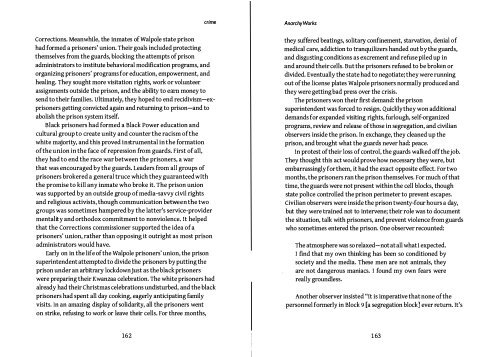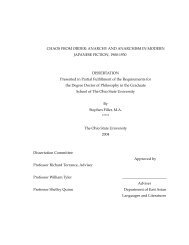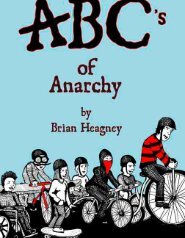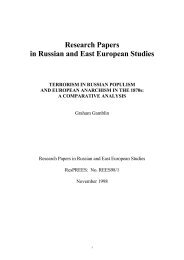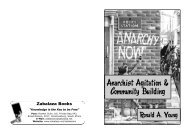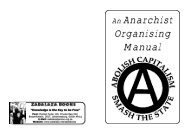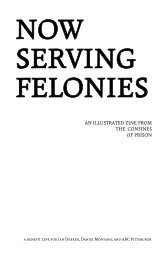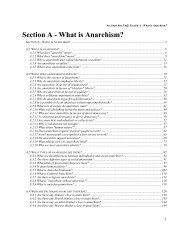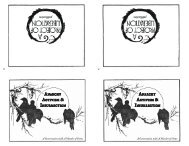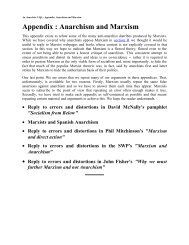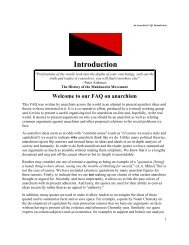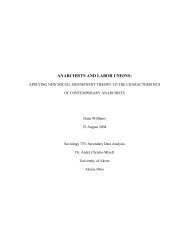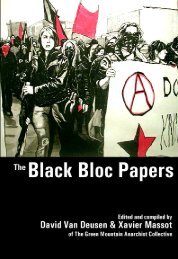Anarchy Works.pdf - Infoshop.org
Anarchy Works.pdf - Infoshop.org
Anarchy Works.pdf - Infoshop.org
Create successful ePaper yourself
Turn your PDF publications into a flip-book with our unique Google optimized e-Paper software.
crime<br />
<strong>Anarchy</strong> <strong>Works</strong><br />
Corrections. Meanwhile, the inmates of walpole state prison<br />
had formed a prisoners' union. Their goals included protecting<br />
themselves from the guards, blocking the attempts of prison<br />
administrators to institute behavioral modification programs, and<br />
<strong>org</strong>anizing prisoners' programs for education, empowerment, and<br />
healing. They sought more visitation rights, work or volunteer<br />
aSSignments outside the prison, and the ability to earn money to<br />
send to their families. Ultimately, they hoped to end recidivism-exprisoners<br />
getting convicted again and returning to prison-and to<br />
abolish the prison system itself.<br />
Black prisoners had formed a Black Power education and<br />
cultural group to create unity and counter the racism of the<br />
white majority, and this proved instrumental in the formation<br />
of the union in the face of repression from guards. First of all,<br />
they had to end the race war between the prisoners, a war<br />
that was encouraged by the guards. Leaders from all groups of<br />
prisoners brokered a general truce which they guaranteed with<br />
the promise to kill any inmate who broke it. The prison union<br />
was supported by an outside group of media-savvy civil rights<br />
and religious activists, though communication between the two<br />
groups was sometimes hampered by the latter's service-provider<br />
mentality and orthodox commitment to nonviolence. It helped<br />
that the Corrections commissioner supported the idea of a<br />
prisoners' union, rather than opposing it outright as most prison<br />
administrators would have.<br />
Early on in the life of the Walpole prisoners' union, the prison<br />
superintendent attempted to divide the prisoners by putting the<br />
prison under an arbitrary lockdownjust as the black prisoners<br />
were preparing their Kwanzaa celebration. The white prisoners had<br />
already had their Christmas celebrations undisturbed, and the black<br />
prisoners had spent all day cooking, eagerly anticipating family<br />
visits. In an amazing display of solidarity, all the prisoners went<br />
on strike, refuSing to work or leave their cells. For three months,<br />
they suffered beatings, solitary confinement, starvation, denial of<br />
medical care, addiction to tranquilizers handed out by the guards,<br />
and disgusting conditions as excrement and refuse piled up in<br />
and around their cells. But the prisoners refused to be broken or<br />
divided. Eventually the state had to negotiate; they were running<br />
out of the license plates Walpole prisoners normally produced and<br />
they were getting bad press over the crisis.<br />
The prisoners won their first demand: the prison<br />
superintendent was forced to resign. Quickly they won additional<br />
demands for expanded visiting rights, furlough, self-<strong>org</strong>anized<br />
programs, review and release of those in segregation, and civilian<br />
observers inside the prison. In exchange, they cleaned up the<br />
prison, and brought what the guards never had: peace.<br />
In protest of their loss of control, the guards walked off the job.<br />
They thought this act would prove how necessary they were, but<br />
embarrassingly for them, it had the exact opposite effect. For two<br />
months, the prisoners ran the prison themselves. For much of that<br />
time, the guards were not present within the cell blocks, though<br />
state police controlled the prison perimeter to prevent escapes.<br />
Civilian observers were inside the prison twenty-four hours a day,<br />
but they were trained not to intervene: their role was to document<br />
the situation, talk with prisoners, and prevent violence from guards<br />
who sometimes entered the prison. One observer recounted:<br />
The atmosphere was so relaxed-not at all what I expected.<br />
I find that my own thinking has been so conditioned by<br />
society and the media. These men are not animals, they<br />
are not dangerous maniacs. I found my own fears were<br />
really groundless.<br />
Another observer insisted "It is imperative that none of the<br />
personnel formerly in Block 9 [a segregation block] ever return. It's<br />
162<br />
163


